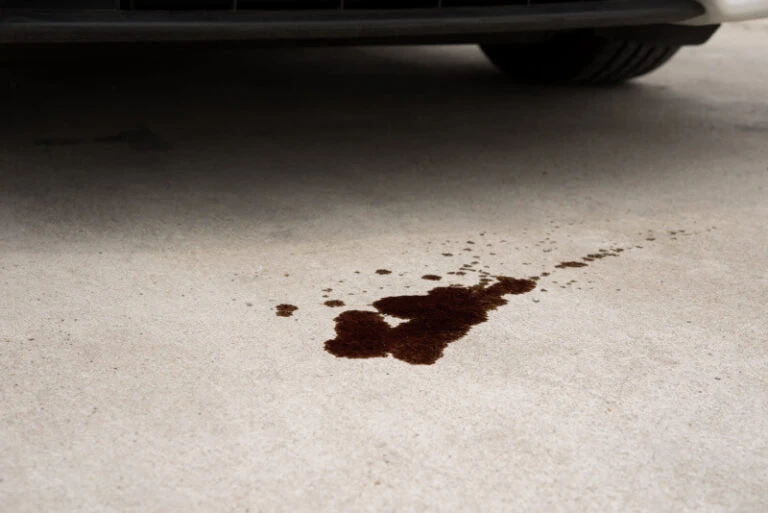
Having to deal with cleaning oil spills from concrete can be a nuisance, especially if you’re not well-versed in the proper cleanup techniques or have the right materials. Read on to learn more about removing those pesky stains:
Table of Contents:
How to Clean Up Oil Stains
The quicker you clean up an oil spill, the better chance you’ll have of removing it. Try the steps below if you come across an oil spill on your commercial or residential property.
- Absorb the oil: Begin by covering the stain with something that will absorb it, like baking soda, kitty litter, sawdust, or cornstarch. Leave the material you choose to apply for several hours or overnight.
- Scrub the stain: After the absorbent material has had time to soak up the oil, scrub it with a stiff-bristle brush to help loosen the oil from the concrete.
- Prepare cleaning solution: Mix hot water and dish soap (or a specialized concrete degreaser) in a bucket to create a cleaning solution.
- Apply cleaning solution: Pour the cleaning solution over the stained area and allow it to sit for 15 to 20 minutes. This will make it easier to remove the stain.
- Scrub the stain: Pick up your scrub brush and clean the stained area. It’s important to pay attention to any stubborn spots.
- Rinse with water: Rinse the affected area with a pressure washer or garden hose. Make sure to direct the water away from plants or storm drains, so as to not contaminate the surrounding environment.
- Repeat: If the stain is still there after the first cleaning round, repeat the above process. Old or set-in stains may need multiple tries for removal and it is highly possible that the stain will not be completely removed.
Pro tip: If the stain is still there, contact a local professional who specializes in oil spill cleanup services. They will have the proper equipment and tools to remove tough stains from your concrete.
To prevent future stains, consider using a concrete sealer to create a barrier that makes it harder for oil to penetrate the surface.
Oil Spill Cleanup Materials
If you’re attempting to remove an oil spill from concrete, make sure to use these materials:
- Kitty litter, baking soda, cornstarch, sawdust, or other absorbent material
- Scrub brush or stiff-bristle brush
- Dish soap or degreaser
- Bucket
- Hot water
- Pressure washer or garden hose
- Protective gloves
- Safety goggles
Why Concrete Oil Spills Are Hazardous
Concrete oil spills can be hazardous both at home and in the workplace. Oil is extremely slick so it comes as no surprise that anyone who steps on it may lose their balance and fall.
Here are some reasons why it’s important to clean up oil spills at home or business:
- Slip-and-fall accidents can create dangerous conditions for workers, pedestrians, drivers, and others.
- Oil spills can contaminate the environment, potentially reaching groundwater, rivers, streams, and other bodies of water. This contamination can also affect ecosystems, wildlife, and plants.
- Exposure to oil spills may also compromise the structural integrity of your concrete and lead to cracks, deterioration, and decreased durability.
- Oil spills also release volatile organic compounds (VOCs) into the air as the oil evaporates, which can negatively impact air quality.
- Oil has a tendency to migrate over time if it’s not properly contained and cleaned. This can lead to cross-contamination and a more difficult cleanup process.
Window Genie Offers Professional Concrete Cleaning and Sealing
Cleaning oil from concrete is not an easy task. If caught and treated quickly the bulk of the stain can be removed. Once the stain sets even with a professional concrete cleaning, in all likelihood there is still going to be some shadowing left behind. An additional option to combat oil stains as well as dirt and discoloration would be to learn about concrete sealing.
If you have concrete affected by oil stains contact Window Genie to learn about possible treatment options. To get started, find a location nearest you or request a free consultation online!
FAQs About Oil Spill Cleanup
How do you handle oil spills at work?
Handling oil spills at work starts with containment. This involves containing the spill with some type of absorbent material (see recommendations above) and working to remove it using a cleaning solution and thorough scrubbing.
What are the hazards of oil spillage?
Oil spills can produce several hazards (mentioned above), which require a proactive approach to cleanup. Whether it’s slip-and-fall accidents or harmful exposure to VOCs, containing and removing oil from concrete is important to prevent future problems.
Cleaning oil from concrete is not an easy task. It requires some expertise and considerable effort, and often cannot be completely removed.
